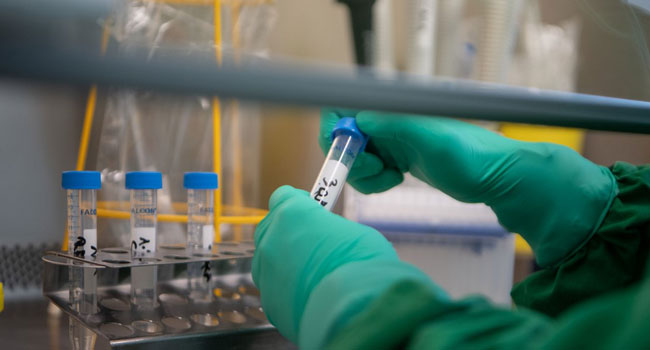The World Health Organisation (WHO) on Thursday urged countries to act urgently and boost prevention measures as COVID-19 case numbers in Africa climb faster than all earlier peaks.
According to WHO, the Delta variant has been reported in 16 African countries, including nine with surging cases.
Dr Matshidiso Moeti, the organisation’s Regional Director for Africa, made the call during a WHO-Africa COVID-19 virtual press conference, facilitated by APO Group.
Moeti was joined by Prof. Jean-Jacques Muyembe, Director-General, National Institute for Biomedical Research, Democratic Republic of the Congo and Technical Secretary of the Multisectoral Committee for the Response to COVID-19 and Prof. Pontiano Kaleebu, Director Virus Research Institute (UVRI).
Also, Dr Richard Mihigo, Coordinator, Immunisation and Vaccines Development Programme, WHO Regional Office for Africa, Dr Thierno Balde, Team Leader, Operational Partnerships, WHO Regionally Office for Africa and Dr Nicksy Gumede-Moeletsi, Regional Virologist, WHO Regional Office for Africa.
READ ALSO: Nigerians seek improvement in NIPOST services, funding
She said that cases had increased in Africa for six weeks running and rose by 25 per cent week-on-week to almost 202, 000 in the week ending on June 27, even as deaths rose by 15 per cent across 38 African countries to nearly 3,000 in the same period.
According to her, the new and faster spreading variants are fuelling the continent’s surging third wave.
“With case numbers doubling in Africa every three weeks, the Delta variant is spreading to a growing number of countries.
“It has been reported in 16 countries, including nine with surging cases. It is the most contagious variant yet, an estimated 30 per cent to 60 per cent more transmissible than other variants.
“It is in three of the five countries reporting the highest case loads for the week ending 27 June.
”And it is dominant in South Africa, which accounts for more than half of Africa’s cases in the same period.
“The speed and scale of Africa’s third wave is like nothing we’ve seen before. The rampant spread of more contagious variants pushes the threat to Africa up to a whole new level,” Moeti said.
She noted that more transmission meant more serious illness and more deaths and urged everyone to act immediately and boost prevention measures to stop an emergency becoming more of a tragedy.
”According to the latest country reports, the Delta variant is detected in 97 per cent of samples sequenced in Uganda and 79 per cent of samples sequenced in the Democratic Republic of the Congo.
”In Uganda, 66 per cent of severe illness in people younger than 45 years is attributed to the Delta variant.
“With rising case numbers and hospitalisations across the continent, WHO estimates that oxygen demand in Africa is now 50 per cent greater than for the first wave peak one year ago,” she said.
Moeti announced that the Alpha and Beta variants have been reported in 32 and 27 countries respectively, saying that the Alpha variant has been detected in most countries in North, West and Central Africa, while the Beta variant was more widespread in Southern Africa.
She noted that both variants were more transmissible than the original virus.
She further said that with WHO’s support, genomic surveillance to track the spread of variants in Africa was increasing.
She said the increase was with the aim of boosting sampling for sequencing by eight to 10 times during the next six months at five laboratories covering 14 southern African countries.
“Although eight vaccines have been shown to be safe and effective and have received WHO emergency use listing, shipments to Africa have dried up.
“Only 15 million people – just 1.2 per cent of the African population are fully vaccinated.
“WHO has set up the African COVID-19 Vaccine Effectiveness Network to document the effectiveness of the available vaccines when used in the African context.
“These studies assess the effectiveness of each vaccine against the variants circulating in the region.
“While supply challenges grind on, dose sharing can help plug the gap.
“We are grateful for the pledges made by our international partners, but we need urgent action on allocations. Africa must not be left languishing in the throes of its worst wave yet,” the regional director said.
She, however, said that African Immunization experts at the biannual Regional Immunization Technical Advisory Group (RITAG) held virtually from June 30 to July 1, 2021, tackled a range of pressing issues.
She said these include COVID-19 vaccines, the status of the malaria vaccine implementation programme, polio eradication and routine immunization progress.
RITAG members and participants offered recommendations to African governments to address key challenges and strengthen immunisation systems.


